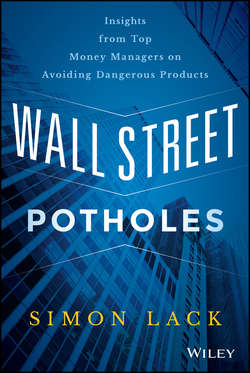Wall Street Potholes

Реклама. ООО «ЛитРес», ИНН: 7719571260.
Оглавление
Simon А. Lack. Wall Street Potholes
Preface
Acknowledgments
Chapter 1. Non-traded REITs: A Security That Shouldn't Exist
Poor Advice
Why Not Get a Listing?
Disingenuous Advice
Whose Side Is Your Financial Advisor On?
Where Are the Regulators?
Overall Returns Are Poor
The Importance of Benchmarking
Puts and Calls
Financial Advisors Need to Do Better
Chapter 2. Why Investors Pay Too Much for Yield
The Mysteries of Closed-End Funds
Investors Can Overpay to Simplify Their Taxes
The HFT Tax
When Managers Run a Company for Themselves
The Ham Sandwich Test
If the Prospectus Says You'll Be Ripped Off, It Must Be Legal
Timing Is Everything
Chapter 3. Why Structured Notes Are Rarely the Best Choice
Caveat Emptor!
Structured Note Basics
Why Buy Structured Notes?
The Heart of the Matter: The Arguments Against
Chapter 4. Update to The Hedge Fund Mirage
Hedge Funds Remain a Great Business
Industry Reaction to the Dismal Truth
Why Hedge Funds Are Still Growing
Some Accounting Rules Are Dumb
Politics Drives Asset Flows
Too Much Capital
For Once, the Retail Investor Wasn't Duped
Chapter 5. Why Is Wall Street So Inefficient?
Why Is Finance So Expensive?
Trading Doesn't Build a Secure Retirement
Invest Time before Money
Sex and Investing
Complexity Sells
The Hidden Costs of Municipal Bonds
Some Bankers Just Don't Think
Chapter 6. The Un-Portfolio and Better Portfolio Management Techniques
Background
Un-Portfolios and Diversification
Fees and the Black-Box Models
Other Examples of Un-Portfolios
Exchange-Traded Funds
Mutual Funds and Fees
Load Funds
Fiduciary Duty
Portfolio Management Basics
Summary and Conclusion
Bonus Section
Chapter 7. Annuities
Introduction
What Is an Annuity?
What Are the Different Types of Annuities?
Variable Annuities
Associated Risks
Other Risks Are Lack of Flexibility
Variable Annuity Riders
Illiquidity, or the Lack of Being Able to Get to Your Money
Evaluation of Returns: Investment Options inside of Variable Annuities
Fee and Charges
Options If You Already Own an Annuity
When Should You Consider Using an Annuity?
Recent Developments with Annuities
Savings Bonds: Little-Known Good Deal
Chapter 8. Is the Most Important Professional in Your Life Even a Professional?1
My Start as a Broker
Pressure to Generate Business
Why You Don't Invest with Borrowed Money
Has the Industry Made Any Progress?
Is Financial Advisory a Profession?
Why You Want a Fiduciary
More Things to Consider When You Choose Your Advisor
A Better Way to Measure Results
Chapter 9. Putting Investors First
The Future of Finance
Understand Who Your Advisor Works For
Really Understand the Fees
Try Asking These Questions
What Else Can Be Done?
The Role of CFA Institute
Bigger Isn't Always Better
About the Contributors
About the Author
Bibliography
Index
WILEY END USER LICENSE AGREEMENT
Отрывок из книги
Financiers were never especially well liked prior to the financial crisis of 2008. The bank bailouts compounded a general belief that bankers always make money regardless of the outcomes for their clients. This popular view had never sat easily with me as one who had made his career first in London and then on Wall Street. Although there were inevitably bad actors, I clung to the idea that part of the reputational challenge was the result of poor understanding by the general public.
Then I met Penelope, as described in Chapter 1, and was prompted to learn about non-traded REITs (real estate investment trusts), a murky corner of the securities markets that can only damage the reputation of anybody involved in the sale of these instruments to the general public. The fees, conflicts of interest, disingenuous marketing, and more fees were breathtaking. That it was all legal, because of its disclosure via a thick, densely written prospectus, was astonishing.
.....
However, not all REITs are good, and a particular class of them called “non-traded REITs” is generally to be avoided. Penelope had unwittingly invested some of her savings in the wrong kind of REIT, one that provides substantial guaranteed fees to the broker selling it while often generating disappointing returns for the investor.
Public securities are registered with the SEC under the 1940 Investment Company Act. Registering a security requires the company to meet various tests for accounting standards, transparency, and so on. The advantage of registering is that the security can be sold to the general public. Unregistered securities have a far more restricted set of potential buyers. The investors have to be “sophisticated” (meaning wealthy, in this case), and the seller of such securities has to adopt a targeted marketing approach, going directly to people he thinks may be interested. You won't often see an unregistered security advertised, because the laws are designed to prevent that.
.....